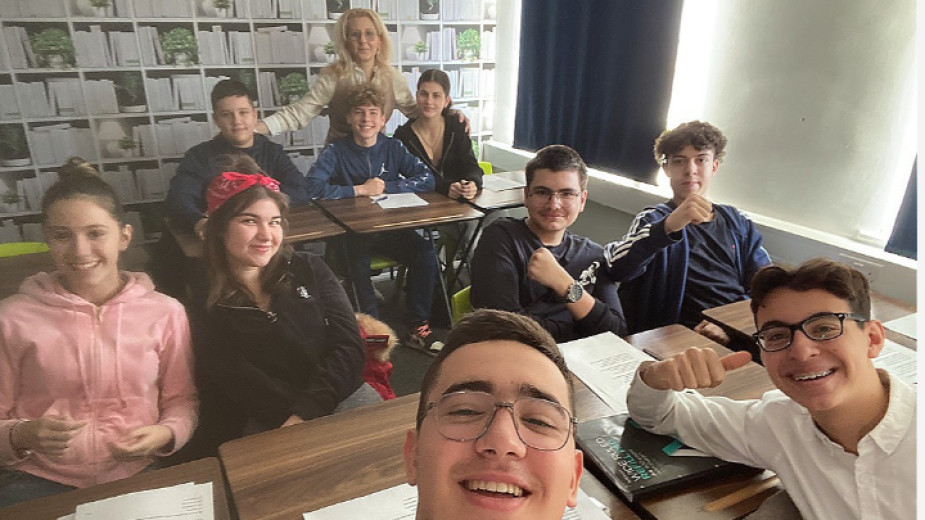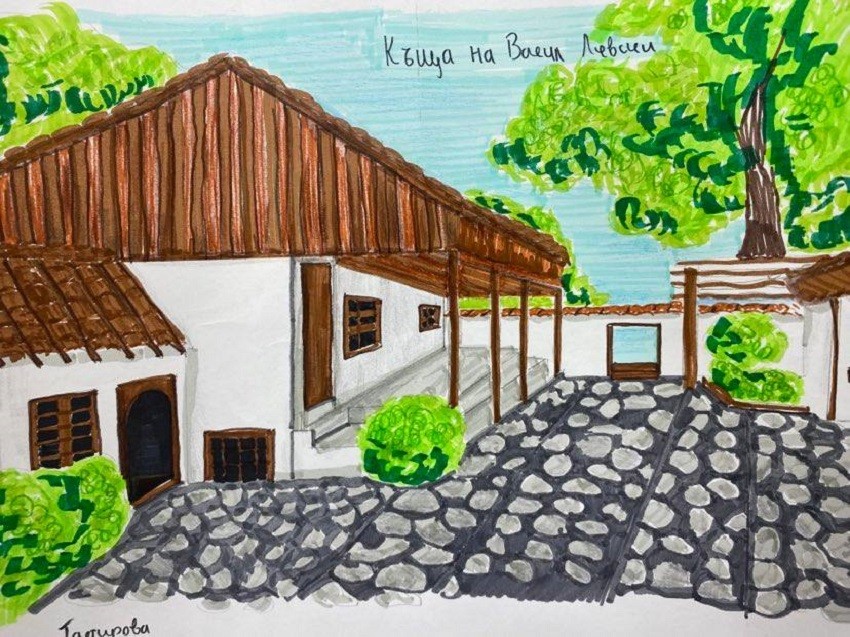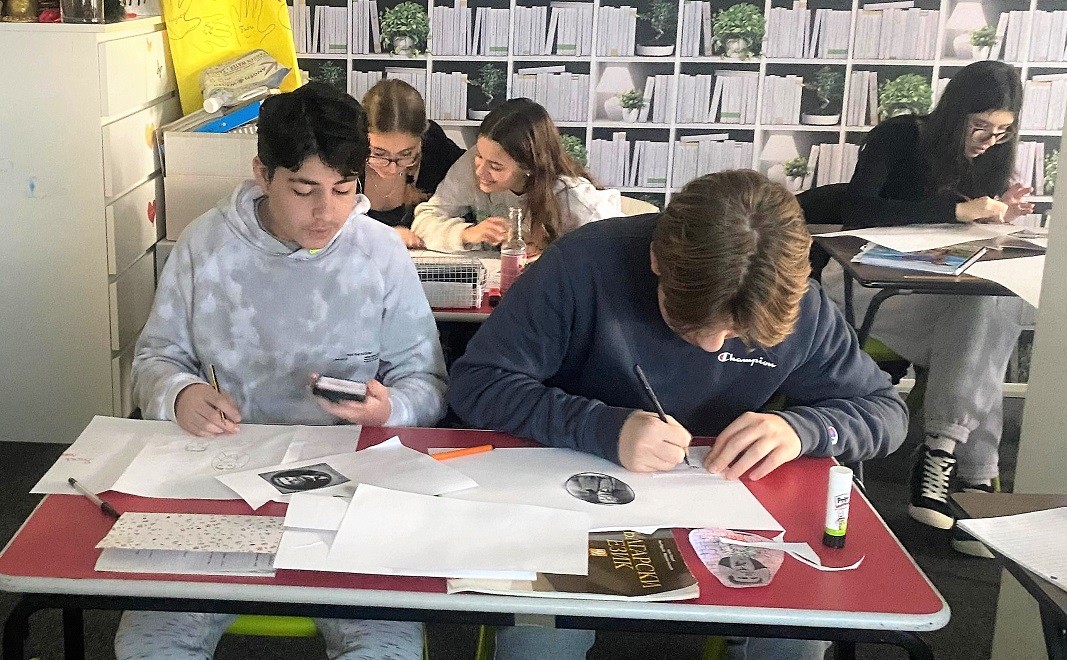 13
13
It is the Easter of 1864. Deacon Vasil Ivanov Kunchev takes off his cassock, cuts off his long monastic hair and gives up his religious service to devote himself to the liberation of his homeland. On St. George's Day of the same year, he starts work as the first teacher in the village of Voinyagovo, a small hamlet nestled at the foot of Sredna Gora, a dozen kilometres from his hometown of Karlovo, where he taught for two years - from May 1864 till end of March 1866. He had 19 pupils - the youngest at the age of 6 and the oldest at 26 - whom he taught not only reading and writing, but also love of country and freedom and tolerance to others.
The legacy of Vasil Ivanov Kunchev, who remained in history as Levski - the Apostle of Freedom, has reached our age. His spirit and the spirit of the times - his and ours - meet in the initiative and perseverance of a Bulgarian woman who, 145 years after revolutionary Vasil Levski, dedicated herself to teaching patriotism to young Bulgarian children thousands of miles from home.
That woman is Milena Vezenkova, one of the many Bulgarians who left for the UK in search of a better future more than 23 years ago. In Britain, she met her husband, also Bulgarian, with whom they started a family and had children.
An entrepreneur at heart, in the autumn of 2008 Milena was considering how to use the premises above the family shop in East London. And from one conversation to another with the Bulgarians in the neighbourhood, they decided to do something they had never done before - open a Bulgarian school in the London borough of Barking and Dagenham.
They renovated the room, equipped it for a classroom, found a good Bulgarian language teacher and without hesitation chose the name - Bulgarian School "Vasil Levski". Four months later, on 18 January 2009, the school officially welcomed its first 20 students.

"With a lot of desire, but no idea how to do it, we tried and succeeded," says Milena Vezenkova proudly in an interview with Radio Bulgaria. Today the Bulgarian School in London educates 500 Bulgarian children in 30 classes from first to twelfth grade, making it the largest Bulgarian school in the UK. The thin thread of history, however, takes us back to the Balkans:
14.07.23 Милена Везенкова 1"I myself am from the village of Voinyagovo, where Vasil Levski taught children reading and writing. To this day there is a school-house there, which is generally referred to as the School. Also the elementary school in Voinyagovo where I studied as a child was named after the Apostle. And when the idea came, so many years later, to have a Bulgarian school in London, I decided that it would be named Bulgarian School "Vasil Levski", like the school in Voinyagovo" – Ms. Vezenkova recalls.
In recent decades, East London has become home to many Bulgarian immigrants and their families. Bulgarian expats want their children to know the culture and language of their ancestors. Milena has often stated her pride in the fact that Bulgarian education abroad is not compulsory, which puts relationships with children and their parents on a completely different footing. The long commute to the Bulgarian Embassy school in London and the inability to attend are some of the prosaic reasons that led to the logical need for a Bulgarian school in Barking.

"The original idea was to introduce the children to everything related to Bulgaria and to teach them literacy. Over time, we have become a real Bulgarian school, where we give solid training and education without losing the original idea - to learn more about Bulgaria. For example, in our school we do not teach about Vasil Levski only when it is in the curriculum. We talk about him and his work from the very first day of school, especially in first grade. If 14 years ago most of our pupils were born in Bulgaria and knew who the Apostle of Freedom was and had heard stories about him, today most of our first-graders were born in the UK and their knowledge of our history and culture is different. That is why Vasil Levski is the first name they learn."
Apart from the historical facts and events, the most interesting stories for the children are related to what was the Deacon like and about his great courage - how he dressed up in different clothes to escape from the Ottoman troops, and how, when he was captured in the Kukrin Inn, it happened because the laces of his shoes got caught on the fence, admits Milena Vezenkova: "I tell them about the school in my home village and how the desks were filled with sand and the children wrote on that sand. And how Levski used to sing songs to them and that he used to take them on hikes to the neighbouring villages. Just little human stories. Of course, we also learn the facts of history, but for us it is important to bring his image closer to them. Everything that can be done about Levski, we have done with our students - from drawing his portrait, making a 3D model of the house-museum of Vasil Levski in Karlovo, which we showed in an exhibition, organizing presentations, writing a letter to Vasil Levski. This year we also made a film in connection with the 150th anniversary of his death."
Milena Vezenkova's words for a more frequent meeting of our glorious history with the spirit of today sound like an appeal. Establishing this link is crucial for preserving national memory for future generations. We already have a different generation of immigrants, she insists.
"The teaching methods we used 14 years ago, even five years ago, are already outdated and do not work adequately for the level of knowledge and temperament of the children who come to us. Most of them have English as their first language, they were born here, their thinking is different. The children no longer see Bulgaria as their homeland. Because, again I say, they were not born there, literally. They look at Bulgaria as a place where they go for a summer vacation and to see the relatives. Their image of Bulgaria is different from the one that I and people of my generation have. For the little ones, Bulgaria is the homeland of their parents."

Milena is an advocate for a more modern and technological way of teaching Bulgarian children abroad, with more hands-on, interactive activities, theatre, music, art - all of which should be an integral part of the learning process today to keep the interest and curiosity in the "new" Bulgarian kids.
"I can firmly say, as a representative of a Bulgarian school abroad, that the state helps Bulgarian schools abroad. Without the support we have from the Ministry of Education and Science it would be very difficult, and in many cases even impossible, to have so many Bulgarian schools abroad. We have the support of Bulgaria and we feel it."
And as Vasil Levski himself says: "We hope for nothing and pray to no one. Everything depends on our united strength. The strongest elements cannot stand a chance against them."
The Bulgarian school Vasil Levski in Barking, East London took part in the initiative of Radio Bulgaria Vasil Levski Revisited on the occasion of the 150th anniversary of the Apostle's death. Thank you for the wonderful photos and video, which make us empathize with the lessons of patriotism, in which each Bulgarian child builds his or her "relationship" with the heroes of Bulgarian history and the most revered among them - Vasil Levski!
Translated and posted by Elizabeth Radkova
Konyovets village near Shumen is marking 160 years since the oldest stud farm in Bulgaria was set up. Celebrations are being organized on the farm on 1 November when officials from the Ministry of Agriculture and Food and of the State Fund..
The Professional Association of Robotics, Automation and Innovation s unites over 80 Bulgarian and international companies that have one global objective - to establish our country as a center for technology development . To achieve this dream,..
The votes in the early parliamentary elections on October 27 outlined an even more diverse parliament. The initial forecasts were for a 9-party National Assembly, but the results that the CEC announced after processing all the..
The Embassy of France and the French Cultural Institute brought together scientists to present their experience and the scientific..

+359 2 9336 661
